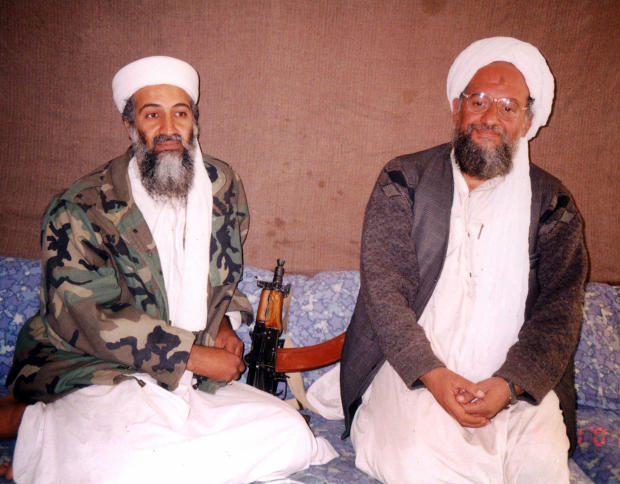Ayman al-Zawahiri, al Qaeda leader killed in U.S. strike, was seen as brains of bin Laden’s terror group
Al Qaeda #AlQaeda

President Biden on Monday is announcing news that the U.S. killed al Qaeda leader Ayman al-Zawahiri in a drone strike in Afghanistan. The terrorist leader was 71.
Though not as well known as Osama bin Laden, Al-Zawahiri was believed to be the true architect behind the worst terrorist attacks in U.S. history on Sept. 11, 2001. For years, he was known as al Qaeda’s No. 2 man, when analysts say he was really the brains behind the operation.
Al-Zawahiri has long been a wanted man. After the 9/11 attacks, then-President George W. Bush released a list of the FBI’s 22 most wanted terrorists — al-Zawahiri was near the top of the list, along with bin Laden. Bin Laden was killed by U.S. special forces in 2011, but al-Zawahiri would elude attempts on his life and an international manhunt for over another decade.
 Al Qaeda leader Osama bin Laden, left, sits with his adviser Ayman al-Zawahiri, during an interview with a Pakistani journalist at an undisclosed location in Afghanistan for an article published Nov. 10, 2001. Getty Images
Al Qaeda leader Osama bin Laden, left, sits with his adviser Ayman al-Zawahiri, during an interview with a Pakistani journalist at an undisclosed location in Afghanistan for an article published Nov. 10, 2001. Getty Images
Al-Zawahiri was born into a prominent Egyptian family, attending Cairo’s best schools and becoming a practicing physician. He became active in Islamic fundamentalism in his teens, joining the Islamic Jihad. When the group assassinated Egyptian President Anwar Sadat in 1981, al-Zawahiri was one of hundreds arrested and put on trial.
He was kicked out of Egypt in 1984, after serving his sentence, and migrated to Afghanistan. There, he met bin Laden, and they formed a bond, merging al-Zawahiri’s ties to Islamic Jihad and bin Laden’s al Qaeda. Together, they shared a motive — to kill Americans, military and civilian alike. Following other attacks, their plotting culminated in Sept. 11, 2001.
While al Qaeda’s relevance and influence has declined, it continues to be a violent presence in the Middle East and Africa.
The successful strike against al-Zawahiri comes roughly one year after U.S. troops withdrew from Afghanistan, ending the military presence that began two decades earlier in the wake of 9/11. The decision to withdraw was controversial, and the chaotic process was marked by the deaths of some U.S. troops and many more Afghans as the Taliban took control.
— Charlie D’Agata contributed to this report.
Trending News